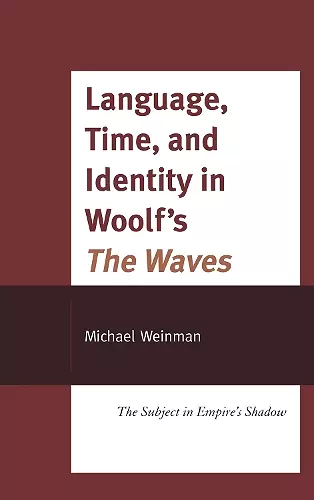Language, Time, and Identity in Woolf's "The Waves"
The Subject in Empire's Shadow
Format:Hardback
Publisher:Lexington Books
Published:12th Jan '12
Currently unavailable, and unfortunately no date known when it will be back

Focusing on the importance of formal experimentation for matters of content and meaning, this original interpretation of what Woolf called her “play-poem” argues that with its depiction of a certain social setting—populated by individuals that are often traumatized, hurt, and socially isolated—The Waves must be read both as an attestation to the social estrangement inherent in modern and metropolitan life and as an allegory of the collapse of the classical subject itself, as a model and a phenomenon, both in literature and in ordinary life. This book differs from other approaches to Woolf as a modernist dramatist of modernity; while others highlight the historically contingent features of Woolf’s dramatic interpretation of her times, Michael Weinman detects the emergence of an expressly atemporal model from this historical moment. The key mechanism that makes a new insight into Woolf’s modernist agenda possible is the discovery of Judith Butler’s theory of subjectivity as presenting a thesis that analyzes precisely that which Woolf, in this work of fiction, dramatizes: a figure, argued here to be the protagonist of Woolf’s work, called the “conspiratorial intersubjective self.” In short, Weinman demonstrates that the historical circumstances of Woolf’s “modernist” project in The Waves serve both concrete and allegorical roles, and that thinking about this work together with Judith Butler’s “performativity thesis” is the best way to see how.
Virginia Woolf's The Waves is notoriously considered both as an extraordinary experiment, stretching the limits of the novel towards its own collapse, and as a modernist novel par excellence. Michael Weinman's extremely detailed reading of Woolf's novel takes this paradox as a starting point for a sustained analysis of the complex ways in which the formal peculiarities of the work may offer a possibility of overcoming the theoretical impasse identified by some critics in Judith Butler's theory of the self in Excitable Speech. Structured around the theoretical scaffolding of Butler's theorization of the source of selfhood and personal identity as self-generative performance in language, this study offers a lucid and refreshing investigation of Woolf's novel, never losing sight of the heated critical debates around its sources and objects of inquiry. Chapter after chapter, the reader is led through the exploration of the novel's grappling with three main “chiasmic relations”, those of language and identity; time and narrative; unity and diversity, towards a final understanding of The Waves' supposed failures of individuation and character development as actual dramatizations of the dynamics of subjectivity, and towards the fascinating identification of the novel's main protagonist, a “conspiratorial intersubjective self”. -- Laura Scuriatti, European College of Liberal Arts
This excellent book combines a close and faithful reading of the text with a dexterous and formidable philosophical analysis of the concepts of narrative, subjectivity, diversity, language, temporality, and selfhood in Virginia Woolf's The Waves. His sensitive reading, analysis, and development of his argument culminate in compelling fashion, delivering the clinching support for his thesis of 'conspiratorial intersubjectivity' in the final pages. Michael Weinman has succeeded in significantly extending and improving upon the critical literature, and his interpretation demonstrates philosophical depth in employing contemporary theories of subjectivity that render The Waves and its characters in novel and creative ways. His critical analysis, in turn, extends questions of human agency that are entirely relevant to wider philosophical discussion as well. Highly recommended. -- Brendan Hogan, New York University
One of the most striking features of Weinman’s monograph is his level of awareness of the intricate and paradoxical dynamics which are active in this text and allow it perpetually to evade any fixed interpretation. It is in fact the ever-moving and ever-open nature of The Waves which motivates Weinman’s choice of this text for his elucidation of how philosophical inquiry and literary theory may combine in the attempt to single out the dynamics at work between language, time and identity, a multi-directional and many-sided set of relations that the author aims to explore through the constant interaction between textual analysis and philosophical investigation. Weinman proceeds through a strongly analytical method which clearly identifies, throughout the book, the purposes of the three sections which are meant, progressively, to lead to his concluding proposal to conceive The Wave. The well sustained argument carried out in this book results from a solid textual and theoretical methodology, which is evident also in the accurate definitions that Weinman constantly provides of the terms he employs, a feature which proves fundamental when dealing with major conceptual issues wherein clarity of intent and terminology are most required. At the same time, as suggested, the monograph is all but an “arid” conceptual reading of Woolf’s text. To the contrary, it exemplifies how the merging of philosophical and literary investigation proves essential for disentangling the complex matter at the heart of Woolf’s writing, and how, conversely, her texts offer us the opportunity of re-discussing and, possibly, better understanding philosophical ideas. * Woolf Studies Annual *
ISBN: 9780739147122
Dimensions: 240mm x 162mm x 18mm
Weight: 435g
174 pages